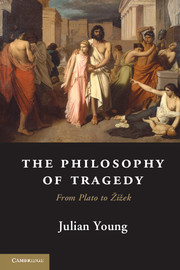Book contents
8 - Kierkegaard
Published online by Cambridge University Press: 05 June 2013
Summary
Volume I of Either/Or (K) by Søren Kierkegaard (1813–55) contains a difficult essay entitled ‘The Ancient Tragical Motif as Reflected in the Modern: An Essay in the Fragmentary Read before a Meeting of the Symparanekromenoi’. The last word is a neologism meaning something like ‘society of those who are living lives which are spiritually or mentally entombed and isolated’. Since the essay is largely a commentary on Hegel’s distinction between ancient and modern tragedy, this chapter is in many ways a continuation of its predecessor.
‘Kierkegaard’ begins the essay by noting that the theatre-going public and ‘experts’ alike agree that ‘there is an essential difference between ancient tragedy and modern tragedy’ (K, p. 137). As the discussion proceeds, it becomes evident that the foremost of these ‘experts’ is Hegel. Kierkegaard adds his voice to this general agreement and defends the thesis against several objections. Certainly, he says, people still appeal to Aristotle’s Poetics as an authority for writing and judging tragedy, but Aristotle’s account of tragedy is so general that two radically different species of drama can be accommodated within it. And to say that ‘the tragic’ must be invariant through the ages because the disposition to be brought to tears by dramatic artworks exists in all ages is like saying that ‘the comic’ must be the same at all times and places because the disposition to laughter exists at all times. The latter claim is manifestly silly because humour is notoriously variable among different ages, languages and cultures (K, p. 138).
- Type
- Chapter
- Information
- The Philosophy of TragedyFrom Plato to Žižek, pp. 139 - 151Publisher: Cambridge University PressPrint publication year: 2013

